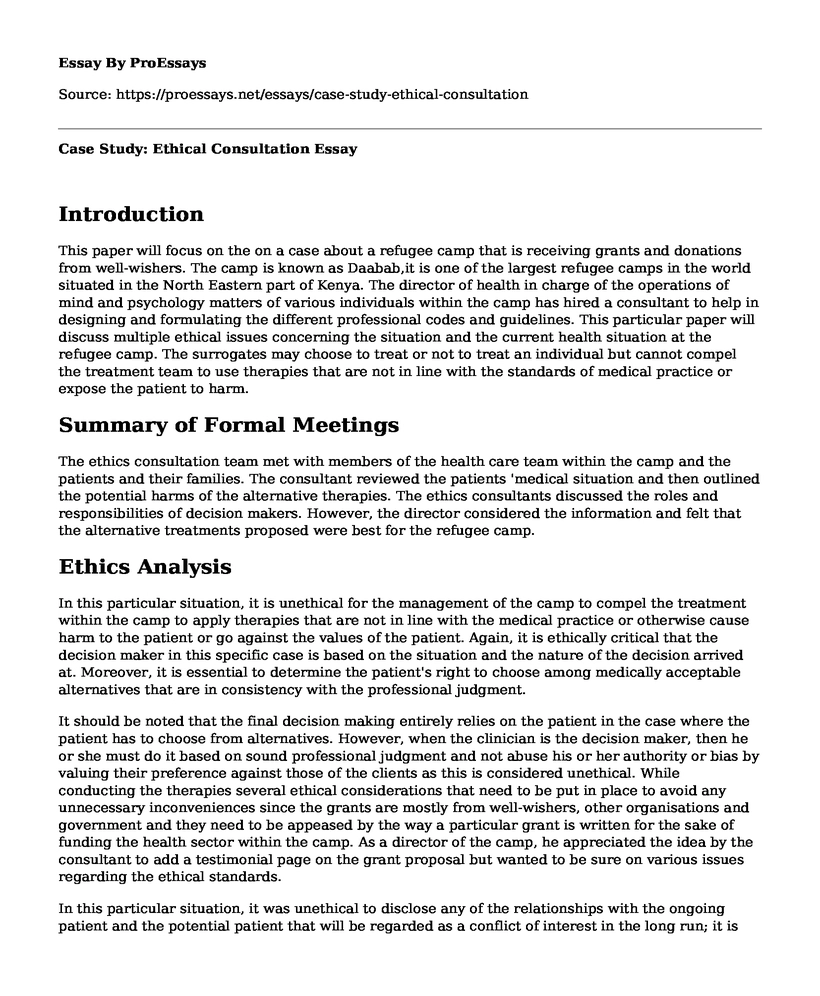Introduction
This paper will focus on the on a case about a refugee camp that is receiving grants and donations from well-wishers. The camp is known as Daabab,it is one of the largest refugee camps in the world situated in the North Eastern part of Kenya. The director of health in charge of the operations of mind and psychology matters of various individuals within the camp has hired a consultant to help in designing and formulating the different professional codes and guidelines. This particular paper will discuss multiple ethical issues concerning the situation and the current health situation at the refugee camp. The surrogates may choose to treat or not to treat an individual but cannot compel the treatment team to use therapies that are not in line with the standards of medical practice or expose the patient to harm.
Summary of Formal Meetings
The ethics consultation team met with members of the health care team within the camp and the patients and their families. The consultant reviewed the patients 'medical situation and then outlined the potential harms of the alternative therapies. The ethics consultants discussed the roles and responsibilities of decision makers. However, the director considered the information and felt that the alternative treatments proposed were best for the refugee camp.
Ethics Analysis
In this particular situation, it is unethical for the management of the camp to compel the treatment within the camp to apply therapies that are not in line with the medical practice or otherwise cause harm to the patient or go against the values of the patient. Again, it is ethically critical that the decision maker in this specific case is based on the situation and the nature of the decision arrived at. Moreover, it is essential to determine the patient's right to choose among medically acceptable alternatives that are in consistency with the professional judgment.
It should be noted that the final decision making entirely relies on the patient in the case where the patient has to choose from alternatives. However, when the clinician is the decision maker, then he or she must do it based on sound professional judgment and not abuse his or her authority or bias by valuing their preference against those of the clients as this is considered unethical. While conducting the therapies several ethical considerations that need to be put in place to avoid any unnecessary inconveniences since the grants are mostly from well-wishers, other organisations and government and they need to be appeased by the way a particular grant is written for the sake of funding the health sector within the camp. As a director of the camp, he appreciated the idea by the consultant to add a testimonial page on the grant proposal but wanted to be sure on various issues regarding the ethical standards.
In this particular situation, it was unethical to disclose any of the relationships with the ongoing patient and the potential patient that will be regarded as a conflict of interest in the long run; it is unethical not to assist the client to understand the fundamentals of attempting to create an honest and open relationship with a clinician before the treatment commence; the consultant needs to be honest about the capacity of the organization to operate based on the health program; and again, the consultant has to cooperate with other departments such as the health department to assist in formulating an accurate therapeutic operations.
Other Concerns About the Consultant’s Strategies
Ethical considerations are critical since they assist in distinguishing the difference between acceptable and unacceptable behaviours as far as the medical practice norms are concerned. First, ethical standards help to avoid falsifying of data. Moreover, better strategy by the consultant would assist the camp in enhancing a collaborative work because it promotes an environment of trust, accountability, and mutual respect among the patients' families and the decision makers. This is especially essential while regarding issues associated with confidentiality. The strategies used the consultant has to be appealing to even the public based on several factors such as on matters of human rights, and compliance with the medical practices.
Conclusion
Recommendations
The consultation team needs to put into consideration some of the ethical analysis stated above and review some of the literature the ethics consultants give on:
Alternative therapies. Moreover, clinicians need to integrate alternative care into the treatment plan. And again, the consultative team should negotiate a treatment plan that encompasses only the demanded therapies that are considered safe. For instance, should be offered support services such as social work or chaplaincy. The team will further explore the possibility of incorporating the use of one or more alternative therapies. The ethics consultant team will keep update in with the treatment team and the patients' families over a certain period.
Cite this page
Case Study: Ethical Consultation. (2022, Nov 19). Retrieved from https://proessays.net/essays/case-study-ethical-consultation
If you are the original author of this essay and no longer wish to have it published on the ProEssays website, please click below to request its removal:
- Future Nursing Recommendation Paper Example
- Terrorism & Diaspora: The Radicalization of a People - Essay Sample
- Parents Satisfied With HPV Vaccination Program: Ready to Vaccinate Children - Essay Sample
- Marijuana: Adverse Effects Despite Potential Benefits - Essay Sample
- Opium: From Ancient Empires to Latin America and Afghanistan - Research Paper
- Essay Example on Immigration: Pros and Cons in the Modern World
- Essay Example on Indian Removal Act of 1830: A Systematic Genocide?







